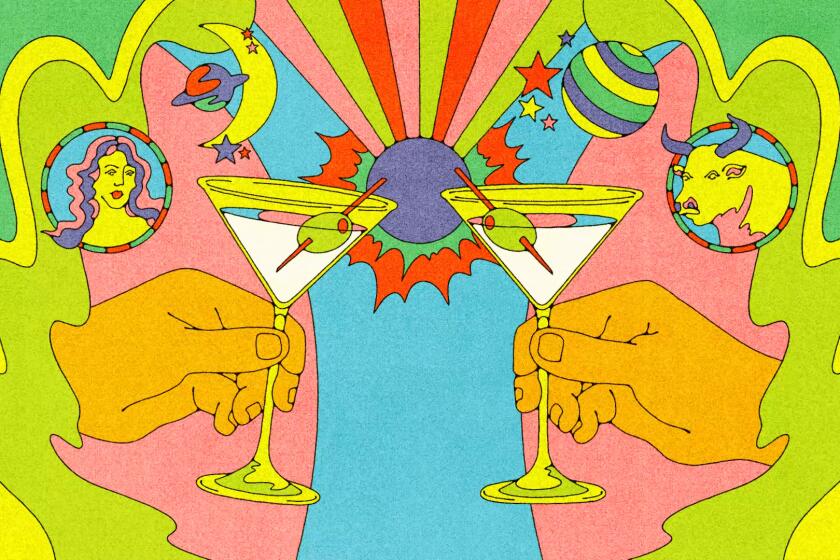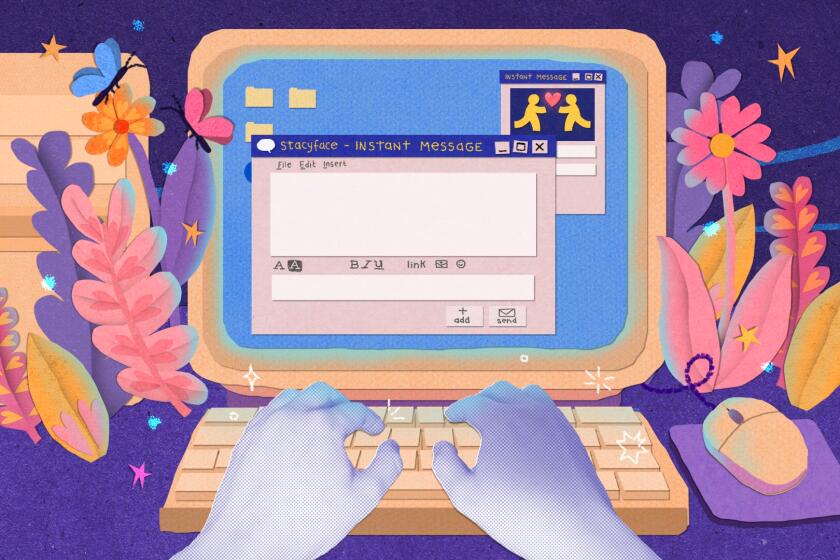Column: Happy Valentine’s Day from the most contented single woman you’ll ever know: me

- Share via
It’s Valentine’s Day, so of course, my thoughts have turned to love.
My love of candy.
See’s candy, specifically, which I can (and do!) buy for myself.
I’ve been single for 13 years or so, ever since I came home from work one day and found a manila envelope on the kitchen table with a divorce summons from my husband, who was at that very moment chatting calmly in the den with my daughter, then a senior in high school, about what classes she planned to take her first year of college.
“Don’t you remember?” he said later, after I went a little bit crazy and dumped all of his clothes on the floor in the extra bedroom. “We’ve always planned to get a divorce when Chloe finished high school.”
We had? News to me.
When I spoke to a divorce lawyer, the man shook his head and said, “I’ve been doing this for 25 years and I have never heard of someone filing for divorce without mentioning it to their spouse.”
I met one of my exes on Grindr. He was an astrological match, and our Virgo/Taurus vibes were palpable. But was that enough for a real relationship to bloom?
I was so traumatized that a few years passed before I could even utter the word “ex-husband” or mention in a casual conversation that I was divorced. I’d been married for so long that being half of a couple was simply part of my identity. I never saw, or even really imagined, myself as single.
Yet now, all these years later, I cannot imagine myself as anything other than single. How on Earth do people get divorced after 30 years of marriage, then turn around and remarry someone else? Of course I’ve dated, but the idea of making a new life with another man holds no appeal to me. My life is full, my friendships are deep, my work is rewarding.
I will probably never forgive my ex for the way he handled things at the end, but after nearly 30 years of marriage, he’d become a different man and, as it turned out, not one I really wanted to spend the rest of my life with anyway. He wanted to sell the house and travel the world by himself.
Accepting that took a lot of work on my part. I wanted to be angry with him, but how do you stay angry at someone who actually did you a favor? These days, we are friendly. We share holidays with the kids. In October, he and I walked our daughter down the aisle together. Things are fine.
Let’s celebrate the people who threw caution to the wind and ventured to (or away from) L.A. in the pursuit of love, dating, marriage or some state of togetherness.
Better than fine, actually. I did not realize how much I would love not being married.
The night before my wedding, my mom took me aside and told me that the secret to a good marriage was the willingness to compromise. Good advice for sure.
But what a blessing it is not to have to compromise anymore. I spend my money the way I want, vacation where I want, stack the plates in the dishwasher the way I want. And best of all, no more struggle, no more fights!
Not that fighting is all bad. In their new book, “Fight Right,” the married psychologists John Gottman and Julie Schwartz Gottman contend that marital conflict is important.
“We tend to equate low levels of conflict with happiness, but that just isn’t true,” the Gottmans write. “The absence of conflict doesn’t indicate a strong relationship — in fact, it can lead to exactly the opposite. … It’s not whether there’s conflict in your relationship that makes or breaks it. Even the happiest couples fight. It’s how you do it.”
I flew back to my husband, brushing off the night with Anthony as harmless flirting. But every time I remembered his fingers against my leg, an electric surge swept my body.
In 1996, the pair founded the Gottman Marriage Institute in Seattle, an evolution of the work that John Gottman had been doing at the University of Washington with his research partner Robert Levenson.
In 1986, the two had built an “apartment laboratory” on campus, and invited couples to stay so researchers could study their communications patterns. Eventually, thousands of couples volunteered to stay at what was inevitably dubbed the Love Lab. Researchers observed their facial expressions, body language and conversations. Couples were hooked up to machines that recorded their heart rates and blood pressure.
“Gottman made his reputation by bringing hard science into a field — the ordinary marriage — that had long been the province of therapists,” wrote the journalist Philip Weiss, who spent a not-entirely-happy night at the Love Lab with his wife in 2000.
I started a conversation with her in a chat room. She was witty and had razor-sharp quips, parrying every attempt at deeper connection with playful defiance.
Observing the first three minutes of a fight, Gottman discovered he could pretty accurately predict the status of the relationship six years later. They could predict whether a couple would divorce with an average of more than 90% accuracy.
Doomed couples, he discovered, used four unpleasant styles to communicate: criticism, contempt, stonewalling and defensiveness. Technically, this theory is called “the cascade model of relational dissolution.”
Couples whose relationships were bound to last, Gottman discovered, maintained what he called a “magic ratio” during conflict — five positive interactions for every one negative interaction.
I think back on my marriage and I cannot for the life of me remember much about our conflicts.
But what I feel ever so grateful for is that we don’t have them anymore.
More to Read
A cure for the common opinion
Get thought-provoking perspectives with our weekly newsletter.
You may occasionally receive promotional content from the Los Angeles Times.













